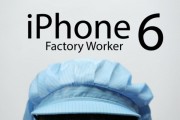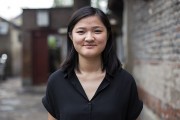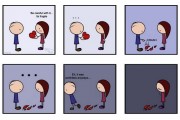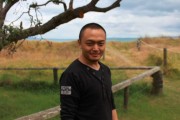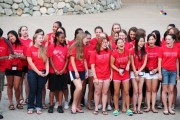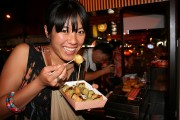“Do you know what a banana is?” a colleague asked me the other day. “I’m… not sure I know how to respond to that, Andy.” He laughed. “No, no. It’s sort of a racial slur. It means ‘yellow on the outside, white on the inside.’ I’m surprised you’re not familiar.”
I wasn’t. His surprise stemmed from the fact that I’m half-Chinese (a banana split?) as, by coincidence, is he. The term “banana” is generally used to describe American-born Chinese (ABCs) who by all appearances are Asian but are all-American in life. On this particular work day, it prompted musings and a discourse over our mixed bag of heritage.
“Do you feel more Chinese?” he asked, putting the question to himself, “or American? Neither? Does one automatically feel more Western if they’re raised in the United States?” All good questions. And actually, questions I’d asked of myself years prior to setting foot on Shanghai soil.
My childhood was as American as they come. Picket fences, apple pies (cooled on the counter, not the sill). Sitcom and toy indulgences, jean shorts cut high and frayed. Hop-scotch at recess, the ice cream man. Proms, plays, soccer games (my town’s substitute for football). Post-grad road trips ’round the country. Americana at its best.
But there were subtle differences. Friends who were baptized had been so in a local church, not as I had, in Taiwan. Required raids on my mother’s closet produced heartbreakingly fine cheongsams in addition to funky sweaters. Wonton-making. Drawers filled with chopsticks alongside china. Strategic scrolls along random walls – lush calligraphy proffering I-knew-not-what.
I was never called a yellow fruit, no, but was always seen as slightly different. I bore the pudge and pimples symptomatic of teendom, but also a bridge-less nose and “strange”ly-shaped eyes. Parents and comrades urged me to celebrate these quirks. Find them unique instead of ugly. But, less-supportive counterparts (boys), each with their jibes and jabs, seemed set on branding me the latter. (My therapist’s bill is in the mail.)
Surface aside, I was confused as to where I fit. Freshman year I joined the local Sewickley Asian Youth group (SAY!) in an effort to find my place. Suddenly, I went from being the most Asian person in the room to, by far, the very least. No less confusing, no.
College apps and doctor’s forms never helped much with the cause, always leaving me with “Other” as the only box to check. Two weddings and one funeral saw my four, full-blooded cousins chatting easily with our gran, while I enjoyed only hugs and kisses, having never learned Chinese.
In many ways, college was a cool compress for what had been a blazing summer. Not only was I now surrounded by every race imaginable, but also by so many others who were “Other.” Irish tinged with Indian, African-American mixed with Scot. This cornucopia brought my brethren, and with them, a query that finds me to this day.
“So, what are you?”
The first nine times I heard the question I struggled to find response. A freshman? A voice major? Salad enthusiast? Eggplant avoider? “No, what’s your nationality? Like, where are you from?” Oh.
The word choice seemed awfully curious for a question as plain as that. And, given my prior experience, I always took it to mean more. I wasn’t alone.
“It’s so annoying and it happens all the time,” a friend (Indian/Japanese) muttered years ago, peering into a brownstone’s fridge. “I would never walk up to a white person and say, ‘Hey man. What are you?’ But because we look different -not white, not black, not yellow- it seems alright to ask. Like it’s a compliment. But it’s not.”
I never took it quite the same. I recognized it was often meant to be just that, an appreciation of something new. But for those of us who’d always hovered between two cultures, were lightly teased in youth for that which now makes us unique, had struggled to find the middle between two races’ inherent traits – it is more complicated than it seems.
For the most part, living in China hasn’t simplified things much. Here, I’m never asked that age-old question simply because it’s assumed that I am “white.” Mention of my Chinese half usually results in shock waves and utter disbelief. “No! But you’re SO white!” True, my current pallor does demand that a role in “Twilight” receive some thought. But it’s not the lack of melatonin to which my new neighbors refer.
Turns out that thirty years in America (save an odd summer here and there) have left me profoundly – American. Not in the stereotypical manner of too-loud voices, absent humility, or constant fast-food consumption. But in that I am optimistic, mostly confident, believe my opinions should be heard. And though the past few years have made it less easy than it once was, I am happy for all that upbringing and brandish my passport with only pride.
And yet this, coupled once again, with being the least Asian in the room, leaves me still mostly undefined. I don’t speak Chinese (yet) but have an entire half of family where English is not the norm. I swing a chopstick deftly but have yet to produce anything tasty from the wok. My appearance raises that old question in one country and flat confusion in the next. I’m crap at accepting compliments (China) but a mean thrower of verbal barbs (States).
For now, I’ve accepted the confusion. In an age where I can look no further than my president for an example of multi-race, it’s possible that I will soon become the “norm,” asking the blue-eyed, “So, where’re you from?” And, in the meantime, I’ve finally settled on an answer to that question, should I be asked it yet again. A question for a question- “Well, let’s see. How much time you got?” – is now my standard, set reply.
